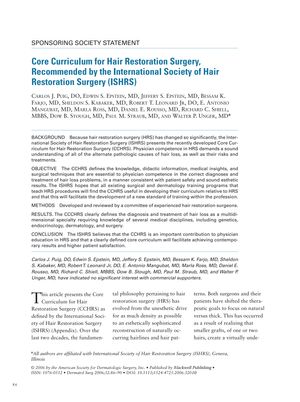Core Curriculum for Hair Restoration Surgery Recommended by the International Society of Hair Restoration Surgery
June 2008
in “
Dermatologic Surgery
”

TLDR The International Society of Hair Restoration Surgery created a standard curriculum in 2008 to guide doctors in diagnosing and treating hair loss effectively.
In 2008, the International Society of Hair Restoration Surgery (ISHRS) created the Core Curriculum for Hair Restoration Surgery (CCHRS) to standardize the knowledge and skills necessary for physicians to competently diagnose and treat hair loss. The curriculum, developed by a committee of experienced hair restoration surgeons, covered a broad spectrum of topics such as the basic science of hair, clinical science, professional and regulatory topics, and interdisciplinary care. The ISHRS intended for the CCHRS to be beneficial for existing surgical and dermatology training programs and to aid in establishing a new standard of training within the profession. The curriculum was designed to be adaptable, with the ability to be expanded or contracted based on user needs. A standing committee was also established by the ISHRS to consistently maintain and update the CCHRS.





